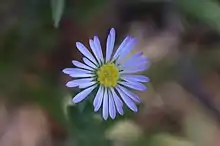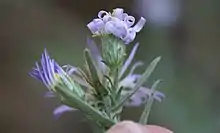Symphyotrichum defoliatum
Symphyotrichum defoliatum (formerly Aster bernardinus) is a species of aster known by the common name San Bernardino aster.[2]
| Symphyotrichum defoliatum | |
|---|---|
 | |
 | |
| Scientific classification | |
| Kingdom: | Plantae |
| Clade: | Tracheophytes |
| Clade: | Angiosperms |
| Clade: | Eudicots |
| Clade: | Asterids |
| Order: | Asterales |
| Family: | Asteraceae |
| Genus: | Symphyotrichum |
| Species: | S. defoliatum |
| Binomial name | |
| Symphyotrichum defoliatum | |
| Synonyms[1] | |
| |
Distribution
It is endemic to Southern California, where it is known only from the San Bernardino and San Gabriel Mountains of the Transverse Ranges, and part of the Peninsular Ranges to the south. It grows in grassland and meadow habitat and in disturbed areas.
Description
This is a perennial herb growing from a long rhizome to a maximum height near one meter. Leaves are widely lance-shaped to oblong and pointed, the largest ones near the base of the stem reaching up to 12 centimeters long. The stem and leaves are roughly hairy.
The inflorescence is an array of flower heads with many narrow white to light violet ray florets around a center of golden disc florets. The fruit is a hairy achene with a long pappus.
References
- POWO (2019). "Symphyotrichum defoliatum". Plants of the World Online. Royal Botanic Gardens, Kew. Retrieved 15 December 2020.
- "Symphyotrichum defoliatum". Natural Resources Conservation Service PLANTS Database. USDA. Retrieved 6 December 2015.
External links
 Media related to Symphyotrichum defoliatum at Wikimedia Commons
Media related to Symphyotrichum defoliatum at Wikimedia Commons Data related to Symphyotrichum defoliatum at Wikispecies
Data related to Symphyotrichum defoliatum at Wikispecies- Jepson Manual treatment
- Flora of North America
- Symphyotrichum defoliatum in the CalPhotos Photo Database, University of California, Berkeley
